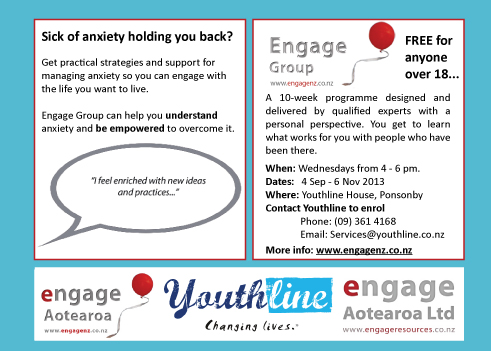Engage Aotearoa has received an open letter to share from a member of the community who has been using one of the Community Mental-Health Services in Auckland. The letter will be read in a week or two to the clinician involved. But they wanted to share their thoughts further than that.
“It is sad to admit,” says service director, Miriam Larsen-Barr, “but we know the experiences of disempowerment and lack of choice highlighted in this letter are rather widespread. We receive regular emails from community members informing us of similar experiences. People don’t want to complain. They want to be heard, valued, respected, listened to and worked with, not worked on. Perhaps if we bring our voices together and get behind each other more we can help turn that balance of power around.“
Open Letter to a NZ Psychiatrist
Dear Doctor
I have written you this letter because every time I attempt to express myself while inside the walls of a mental health facility my words dry up. I choke on my frustration, I sigh at the futility of trying to explain myself to people who have never understood me and I give up. Instead I have put into words well in advance what I want to say to you, so that the message comes across clear. I have written the words down so I can read them calmly, and you will hear them not as mania or psychosis or the rant of a lunatic, but so you will hear them as a carefully prepared statement, and maybe just a few will sink in.
Let me begin by discussing my views on psychiatry in general, so that you understand I have no respect for anyone in your position. I admit, it’s true I have a personal prejudice against psychiatrists, so it would have been hard for you to earn my respect. Here’s why. I think that the entire history of psychiatry has done more harm than good. I think that psychiatry today does more harm than good. You forcefully medicate and detain people against their will, and you claim it helps them. You habituate people to substances which you have absolutely no idea how to help them discontinue. And you repeatedly ignore our service user requests for our own courses of treatment, while claiming you know better because of your education. You think you have a better knowledge of what’s good for me than I have for myself. And you think it because you’re sure you’re better than me in some way, less broken, more together, or more sane. You think my history proves I’m infantile or incapable, and your first and most strong desire is to convince me and make me accept I’m infantile and incapable. Every psychiatrist I have ever seen has been a broken record, and every time I’ve asked for help to meet my own health goals, I’m told I have the wrong goals.
So now I have to come to you personally, doctor. The first memory I have of our meeting, I remember you telling me that because of my history, it seemed obvious to you I would need medication for the rest of my life. Do you tell this to every service user the first time you meet them, Doctor? I’m glad my file is so complete and reliable that you can come to a conclusion about me and the rest of my life based on a few notes that other people have written about me. It’s a bit of a pity that my hopes, dreams, desires, wishes and aspirations don’t come into it at all.
It’s also a pity that you don’t share the rest of your expertise with your patients. Surely you learned something in all that time at university about diet or exercise or meditation or mediation or self-awareness, or in fact any way to flourish other than taking a happy pill. You must have some knowledge from your personal experience of dealing with distress or family members in need. You must have some idea about how to address the skeletons in my closet in a friendly and welcoming environment with someone I feel I can talk to.
Because if you don’t have any advice for me other than what the brand of the day is from the pharmaceutical company who gave you that free pad to write on and coffee mug to drink out of, I really am sad. Because you might as well be a pill vending machine. And maybe one day, when you’re a little older and wiser, you’ll count the years of time you stole from your doped up patients, not to mention the years you took off the end of their lives, and you might feel a little sad too.
Sincerely Yours














